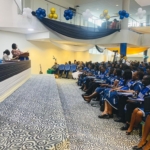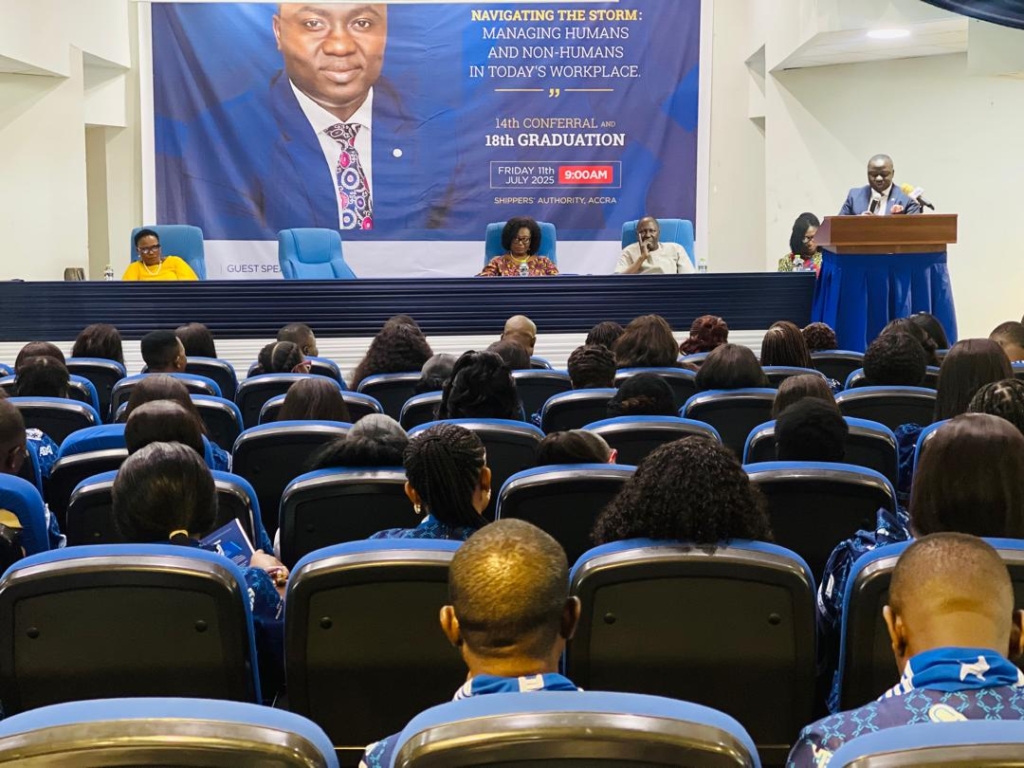
The Chartered Institute of Human Resource Management (CIHRM), Ghana, on Friday held its 14th Conferral and 18th Graduation Ceremony in Accra, conferring Chartered status on 28 new members and admitting 170 as Associate Members.
Delivering a welcome address on behalf of Dr. Francis Eduku, Chief Executive Officer of CIHRM, Yen Sapark, Research & Policy Manager, highlighted the Institute’s growing professional community.
“Today, we are conferring Chartered Human Resource Management Practitioner status on 28 graduates who have completed the Level 4 programme, while 170 Level 3 graduates will join our noble Institute as Associate Members. This means our Chartered membership rises from 399 in 2024 to 427 in 2025, with Associate Members increasing from 2,237 to 2,407,” he stated.
Addressing the gathering, CIHRM President, Florence Hutchful, underscored the evolving workplace landscape driven by artificial intelligence (AI), which calls for HR practitioners to be deliberate in building resilient teams, enabling talent, and shaping work environments where people can flourish.
“Beyond discipline, integrity, courage, and business acumen, HR practitioners must develop emotional intelligence. It is this quality that empowers us to empathise with employees and provide the emotional support that AI can never replicate,” she asserted.

Delivering the keynote address on the theme “Navigating the Storm: Managing Humans and Non-Humans in Today’s Workplace,” the Guest Speaker, Dr. Collins Badu Agyemang, Consultant Organisational Psychologist and Director of the Pan African Doctoral Academy, described HR practitioners in the midst of the current irreversible and rapid transformation of the world of work as standing at the crossroads of human capital evolution and technological disruption.
This he noted, required HR professionals to be “skilled sailors” in a state of ever-readiness with foresight, balance, and resilience to steer through the turbulent waters shaped by the rapid technological disruption and evolving human capital needs.
Humans, he added. have always been at the heart of the workplace, contributing qualities such as empathy, ethical judgment, creativity, critical thinking, and adaptability. These traits enable collaboration, problem-solving, and navigation of complex social and organizational dynamics.
Dr. Agyemang painted a vivid picture of the modern workplace as one at the crossroads of human ingenuity and AI-driven automation; Artificial intelligence and automation are no longer on the horizon—they are rapidly becoming integral to the modern workplace, he added.
He however cautioned that while technologies like algorithms, chatbots, and robotics offer unmatched speed, precision and consistency, they also introduce complex challenges that organisations and HR professionals must be prepared to confront.
He highlighted five pressures that today’s HR practitioners are bound to have started dealing with and/or must be prepared, however late it may be, to deal with:
- AI and robotics reshaping job roles across industries.
- Managing multi-generational workforces with diverse expectations. Five generations (Traditionalists, born in 1945 and before; Baby Boomers, born between 1946 and 1964; Generation X, born between 1965 and 1976; Millennials, born between 1977 and 1995; and Generation Z, born in 1996 and after) —and soon Generation Alpha—converge in the workplace
- Adapting to permanent remote and hybrid work models.
- Balancing data-driven decision-making with human-centered leadership.
- Integrating non-human technologies like algorithms, chatbots, robotics and intelligent systems into teams.
The foregoing challenges notwithstanding, Dr. Agyemang in allaying fears quickly added that, “While non-human technologies excel in speed and precision, humans bring emotional intelligence, creativity, adaptability, cultural sensitivity, and ethical judgment—qualities that remain irreplaceable.”
To this end, “As HR practitioners, we cannot control the ‘wind’ of technological change, but we can certainly adjust our sails,” he concluded, encouraging the adoption of proactive strategies to shape the future of work, urging organisations to adopt proactive upskilling and reskilling strategies, foster ethical technology policies, and create hybrid workplaces that seamlessly blend human and digital strengths.
He challenged HR leaders to champion lifelong learning, nurture critical thinking and emotional intelligence, and ensure that technology serves humanity — not the other way around.
“If calm seas never made a skilled sailor, let us embrace this storm as our opportunity to steer the future of work with courage, innovation and compassion,” he concluded.
The ceremony was attended by the Immediate Past President of CIHRM, Dr. Edward Kwapong, members of the Council, the Professional Certification Board, Resource Persons, Level 4 Supervisors, and proud families and relations of the graduates
